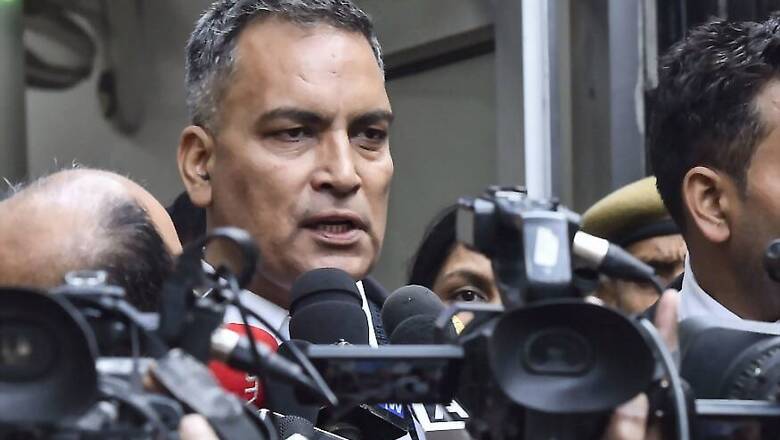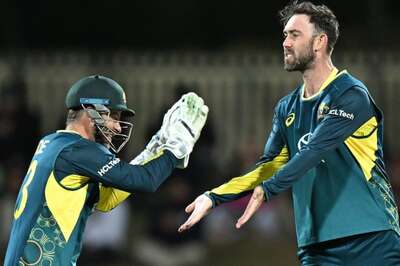
views
“The convicts’ lawyer challenged me that their execution will not happen for an indefinite period..."
These were the words of a distraught Asha Devi on the stairs of the Patiala House Court on January 31. The execution of the men who brutally raped her daughter and left her for the dead on a cold December night in 2012 had been postponed again after the defence lawyer successfully argued against their hanging till each convict had exhausted all his legal options.
Asha Devi’s frustration with the legal system struck a chord with all those present there. But it also brought into sharp focus the fight-back mounted by the defence, particularly by AP Singh, the lawyer for three of the four convicts.
Singh, who has a doctorate in criminology, has been accused of exploiting loopholes in the system to save his clients from execution. Strictures have been passed against him by the Delhi High Court, while the Bar Council has issued notices over his conduct on more than one occasion. In the courtroom, frustrated onlookers are often heard muttering, "isi ko tang dena chahiye (Even he should be hanged)."
But, undeterred, Singh continues to defend the Nirbhaya convicts — Pawan Gupta, Akshay Kumar Singh and Vinay Sharma. The fourth convict, Mukesh Kumar, has a different legal team lead by Vrinda Grover, once an amicus curiae (friend of the court) in the case.
Ajay Prakash Singh, a 46-year-old law graduate from Lucknow University, has been practising in the Supreme Court since 1997. But he shot to fame, or rather infamy, in 2012 when the Nirbhaya rape and murder case went to trial in the Saket court.
In an interview to CNN-News18, Singh said it was his mother who had asked him to take up the case then. "Akshay's wife had come from a village in Bihar to meet her arrested husband in Tihar Jail. Someone there must have passed on my number to her. She came home and met my mother. When I returned home, my mother told me ‘you must fight to give this girl justice’," he said.
The lawyer said he tried to reason with his mother about the consequences of taking up such a case, but she persuaded him. "My parents are simple people, extremely spiritual. They didn’t watch TV, so didn’t have much idea about the protests, Jantar Mantar, Ramlila Maidan, mombatti, dhoop batti, agar batti..." Singh said, referring to the candle-lit marches and protests in solidarity with the 23-year-old victim who was given the name ‘Nirbhaya’ or fearless by the media.
Singh's defence of the Nirbhaya rape convicts began in the Saket court. He took up the cases of two of the convicts — Akshay and Vinay — but failed to get the duo acquitted of the grave charges. His strategy included maligning the deceased victim.
It is seven years later and he still does not regret his conduct.
"Should I not ask what the girl was doing with the boy so late at night? It is part of evidence. I wasn’t saying they had a brother-sister relationship or they were out to celebrate rakhi. All I said was that they are friends. Now in their society, boyfriend-girlfriend relation must be laudable, but not in the culture I come from," Singh said when News18 questioned the need to malign the victim’s character to get his clients acquitted.
Singh's views had led to massive outrage in 2013. After failing to secure victory in Saket court, Singh had openly attacked the judge in the courtroom. "You have not upheld truth, but lies. This decision has been taken under political pressure and for vote-bank politics," he had told Additional Sessions Judge Yogesh Khanna on September 13, 2013.
Outside the court, he lashed out at the media and was panned for his misogynistic remarks.
"If my daughter or sister engaged in pre-marital sex and disgraced herself and allowed herself to lose face and character by doing such things, I would most certainly take this sort of sister or daughter to my farmhouse, and in front of my entire family, I would put petrol on her and set her on fire,” he had said.
Singh has a daughter in college and a son.
Radio City ran a campaign against the lawyer asking him to withdraw from the case keeping in mind the public sentiments, but Singh instead took on another convict, Pawan, as his client as the case went into appeal in higher courts.
While Asha Devi mother pleaded before judges for justice, Pawan's mother and father worshipped AP Singh.
Hira lal, Pawan's father, told News18 that he is confident his son will not be hanged. "I have not met him in Tihar even though jail authorities told me that today can be the last meeting. I am confident my son has done nothing wrong. Courts will hear us," Hira lal said as Singh looked on.
This was on January 30, 48 hours before Pawan was to be executed on February 1. Singh managed to get this date postponed in the next hearing. He filed petition after petition. He pleaded before the High Court that Pawan was a juvenile at the time of the crime. He went to the Supreme Court when the HC refused to grant him relief.
The HC found his strategy frustrating. On January 20, the court said, "The Court deprecates such practice adopted by the advocate. It is not in dispute that an advocate files petition on the instructions of the petitioner. It is also not in dispute that the petitioner is a master of facts, however, it is presumed that the advocate is well aware of the law and the procedure."
Following up on the court order, the Bar Council show-caused Singh.
The judiciary has commented on more than one occasion that the defence team is exploiting loopholes in law, but has failed to stop Singh from extending the lease of life of the death-row prisoners.
It is this failure of the judiciary that frustrates Nirbhaya's parents too. "Court mein bhi sab (defence lawyers) tan kar khade rehte hain. Aisa lagta hai maine galati ki hai. Hum haath jode insaaf 7 saal pehle bhi maang rahe the, aaj bhi maang rahe hain (The defence lawyers are smug in court, while we have been humbly seeking justice for the last seven years," Asha Devi said.
But legal practitioners feel Singh is just doing his job as a defence lawyer to the farthest extent that the law allows.
Manu Sharma, who defended A Raja in the 2G case, cites constitutional provisions and points out that under the Bar Council of India rules, a lawyer cannot refuse to defend an accused on the grounds that general public believes the person to be guilty.
"Under Article 21 of the Constitution, no one should be deprived of his or her life or liberty without strict observance of the due process of law. Under Article 22, an obligation is cast upon the lawyer to ensure that Article 21 is observed and followed,” said Sharma.
“Now if any legal process or recourse is available to an accused or a convict as the case may be, it’s his or her lawyer’s constitutional obligation to see that it’s availed of and followed. The general public should refrain from making irresponsible comments on defence lawyers," he added.
Supreme Court advocate Meet Malhotra, too, argues against public perception taking precedence over legal provisions. "Why is a person brought to trial and punished? Because he broke the law. And, therefore, the punishment has to be in accordance with law. If the law allows you a certain latitude, public pressure can't take away what the law permits you to do," he said.
But it is the public perception that has become the biggest challenge for the Nirbhaya case defence lawyer. "Society ka pressure to tha hi. Shaadi-byah mein, rishtedari mein sunna padta hai ki ye case kyun lad rahe hain. Khas kar ke mahilayen, bacche poochte hain. ‘Marne do na inko, aap kyun ladte ho?’ I have to convince them," Singh said.
The case has brought a lot of bad press for Singh. But it has also led to comparisons with all-time greats like Ram Jethmalani who also faced criticism for defending high-profile clients like KM Nanavati in the 1950s, the assassins of Indira Gandhi, and more recently Jessica Lall murder convict Manu Sharma. Singh is well on his way to match the veteran defence lawyer’s record, having defended former union minister Chinmayanand and self-styled godman Gurmeet Ram Rahim, both accused in rape cases.
Singh that the execution of convicts in the Nirbhaya case is inevitable, but he is determined to fight on. "This will be part of academic research in future about law, about system for death row prisoners," he said.















Comments
0 comment